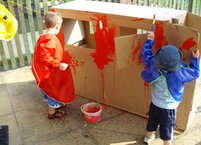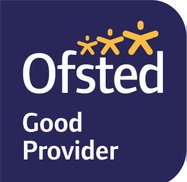yog.org.uk © 2020
"Changing Lives"
A specialist pre school dedicated to giving children and families extra help and support through the early years learning and development journey
Our Local Offer
Yeovil Opportunity Group is a unique Pre School offering specialised support for children and families of children with additional needs
- YOG Pre School is open Monday to Friday 9.00am until 12.00pm.
- Our Rainbows Group for children and parents aged from birth to 2 is held on a Thursday between 1pm and 2.30pm.
- The children who attend our group have identified needs and can be referred to us by a range of professionals, including Health Visitors, Speech & language Therapists, Occupational Therapists, Physiotherapists, GPs, and Paediatricians as well as having strong links with Health, Education and Social care teams.
- Parents can also bring their children to the Group without a referral.
- Our high ratio of staff to children, enables us to provide the highest levels of individualised support & care.
- We are an equal opportunities setting and welcome all children regardless of their needs.
How do we identify children with Special Educational Needs (SEN)?
The Balidon Centre
Preston Road
YEOVIL
Somerset
BA20 2BX
Tel: (01935) 384157
Registered charity
304693
The children who attend the group often have identified needs however there may be times when other additional needs become apparent. We follow the graduated response and monitor children’s progress closely with on going involvement from parents/carers. We would then refer to relevant professionals where necessary with permission from the child’s parents/carers.
How do we support children with SEN and match the curriculum to their individual needs?
Each child is assigned a Key Worker before they begin their first session at the group. The Key Worker will work with the child on a regular basis and be responsible for monitoring progress and keeping records for them. All Key Workers are overseen by the Child Care Lead /SENCO (Special Educational Needs Coordinator) who will ensure that everyone is working consistently. The children’s progress is continually monitored following The Early Years Foundation Stage through observations, progress trackers, developmental journals, ECAT (Every Childs a Talker) documents and IEPs (Individual Education Plans).
All staff are involved in planning on a weekly basis. We use each individual child’s next steps and interests from the previous week to inform our planning and select activities accordingly. We also include targets form care plans drawn up by other professionals who advise us on activities we can carry out.
How do we work collaboratively with parents to support the learning and overall wellbeing of children with SEN?
Our induction process consists of an initial visit either at the setting or in the child’s home depending on parental preference. Parents or carers are always invited in to attend the first session with their child. This gives them the opportunity to meet the Key Worker and provide the important information required to help settle and get to know their child. Parents are under no pressure to leave their child and they can continue to attend the sessions until they feel sure that their child is settled. All staff are on hand to support parents in this process.
Most importantly we have an open door policy where staff can be available to talk to parents or carers at any time should they have any concerns regarding their child. Parents are also invited in once a term to meet with their child’s key worker and look through their development records. They can also request to see these records at any time if they wish. Parents are also invited to discuss targets on their child’s IEP (Individual Education Plan) and take part in the IEP review every half term. Regular meetings are held throughout the year so that parents and carers can meet with all the professionals involved with their child to discuss the current situation and next steps to achieve positive outcomes.
What Specialist Services and Expertise do we access to further support and enhance our provision for children with SEN?
We have a number of professionals who visit our setting on a regular basis including Speech Therapists, Physiotherapists, Portage workers, Area SENCOs and Occupational Therapists. Most of these professionals also see the children outside of the setting and they are best placed to offer all of our staff, students and volunteers support and advice on working with each individual child. They also draw up care plans for us to follow for us to incorporate into our work with the children. We also have meetings every half term with the our area Health Visitor so we can share important information between our setting and health care professionals.. The group has strong links with MAISEY (Multi Agency Intervention and Support in Early Years) which meets every half term. All professionals are invited to attend MAISEY meetings so that relevant information can be shared regarding individual children and if need be systems can be put in place to best support the child and family. No child is discussed at MAISEY without parental consent. Our team regularly attend local Pre-school cluster meetings where they share best practice and ideas with other settings.
We have the benefit of a Music Therapist for one morning a week who works mainly on a one to one basis with some of the children and does a group music session before all the children go home. The children find this very enjoyable and he is able to work with our team on ways we can engage and extend the learning of the individual children he works with through music.
What Special Educational Needs Training do we have at our setting?
All of our staff have many years’ experience working with SEN and all have regular on-going training in a range of specialist areas and work closely with individual therapists and professionals to develop individualised plans and targets. All staff are trained in STC (Somerset Total Communication) as well as PECS (Picture Exchange Communication System). As well as having a fully trained SENCO, all of our team undergo regular training in SEN. Staff are trained to administer medicines for those children who have medical needs. Our child care lead always attends regular SENCO cluster meetings and feeds back to staff on any updates about working with SEN. Our longest serving member of staff recently won the award for best Teacher/Mentor for the whole of Somerset. (Dec 2017).
How do we listen the views of children with SEN?
As an STC (Somerset Total Communication) setting, we use signing, symbols, photos and objects of reference as well as speech in order to communicate with the children and the children are also encouraged to communicate their needs in this way. Some of our children also use PECS (Picture Exchange Communication System) in order to communicate. We also have a very strong partnership working relationship with parents and carers so that we are able to work together to understand how their children communicate at home and at YOG.
Our environment and its accessibility
We are situated within a large building which is accessible to wheelchairs and other specialist equipment. We have 2 playrooms, a sensory room, a bathroom and 3 large outside play areas, all of which is also accessible to wheelchairs and other specialist equipment.
How do we support transitions including moving onto school?
Some of the children that attend our setting choose to do a dual placement with a mainstream setting. We would then arrange or attend a pre-school entry meeting for each individual child with their chosen setting along with parents and relevant professionals. We liaise with the other settings and share important information including developmental records. We also encourage joint IEP planning. For those children transferring into school we organise school entry plan (SEP) meetings at their named school. This is an opportunity for all information regarding the child to be passed onto the school. We complete transition forms with important information relating to development and progress in the areas of learning within the Early Years Foundation Stage. For most children we also work individually with their new school and thier individual teachers to create strategies which will help with transition, including photo books, a home corner where we teach the children about their new school uniform and give them the chance to try it on and organise visits for both the children and their parents or carers to thier new school.
How do we make decisions about the type and how much support individual children with SEN receive?
We continuously monitor and review the children’s progress through the developmental records (EYFS) and weekly staff meetings. We are therefore able to recognise when we feel a child may need more support. We always involve the parents in this process and seek their permission to make referrals to relevant professionals if necessary. Regular family service plans also help to recognise when the child and family are in need of more support which can then be put into place. When additional needs are identified our setting is able to apply for funding for each individual child to help support their needs.
For further advice and support please contact:
Kim Duller
Yeovil Opportunity Group
Balidon Centre
Preston Road
Yeovil, BA20 2BX
01935 384157
Email: Kim@yog.org.uk

